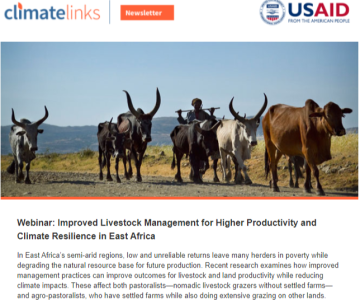
On 29 October 2020 at 14:00 (CEST), USAID is hosting a webinar on "Improved Livestock Management for Higher Productivity and Climate Resilience in East Africa".
In East Africa’s semi-arid regions, low and unreliable returns leave many herders in poverty while degrading the natural resource base for future production. Recent research examines how improved management practices can improve outcomes for livestock and land productivity while reducing climate impacts. These affect both pastoralists—nomadic livestock grazers without settled farms—and agro-pastoralists, who have settled farms while also doing extensive grazing on other lands.
In late 2018, the Climate Economic Analysis for Development, Investment, and Resilience (CEADIR) Activity and the International Center for Tropical Agriculture (CIAT) analyzed the costs and benefits of three improved management practices—deferred-rotation grazing, restoration of degraded rangeland, and fodder cultivation or supplementation—for cattle and small ruminants in the semi-arid Oromia State of Ethiopia. This report built on a 2018 feasibility study by the International Livestock Research Institute (ILRI) of low-emissions development interventions for livestock management in Kenya and Ethiopia. In 2020, ILRI also examined how different social groups respond to climate adaptation measures among herders in central Kenya.
This webinar will discuss how this research and other findings can inform future initiatives for improved livelihoods for pastoralists and agro-pastoralists as well as for natural resource management.
